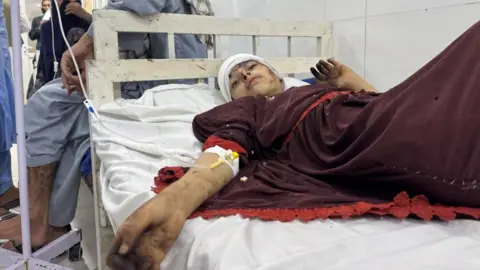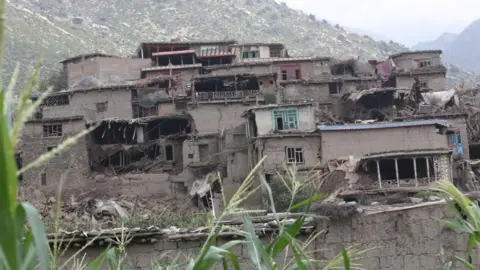More than 800 killed and nearly 3,000 injured after 6.0 magnitude earthquake strikes eastern Afghanistan
Quake flattens villages in remote mountainous region; hospitals overwhelmed and helicopters evacuate the wounded as authorities warn toll may rise
A powerful earthquake struck eastern Afghanistan just before midnight on Sunday, killing more than 800 people and injuring nearly 3,000, the United Nations humanitarian agency and Afghan authorities said on Monday.
The 6.0 magnitude quake hit at 23:47 local time (19:47 GMT) with its epicentre about 27 kilometres (17 miles) east of Jalalabad in Nangarhar province, according to initial reports. Most deaths were reported in neighbouring Kunar province, where entire villages were reduced to rubble, officials said. Rescuers warned the death toll could rise significantly as search teams worked to reach remote communities.

The quake was shallow, reported at an estimated depth of around 8–10 kilometres, and was felt as far as Kabul, about 140 kilometres away, and across the border in Pakistan. Aftershocks followed the initial tremor and are believed to have caused additional collapses and fatalities, officials said.
The United Nations' humanitarian agency said more than 800 people had died and nearly 3,000 were injured. The Taliban administration's spokesman, Zabihullah Mujahid, put the death toll at 812. Sharafat Zaman, a spokesman for the health ministry in Kabul, said helicopters were ferrying the wounded to hospitals after people were plucked from the rubble. Images and accounts from the scene described streets littered with debris and families searching through collapsed homes.
Hospitals in the affected region, already under strain from years of conflict and underfunding, were reported to be overwhelmed. Aid workers and health officials said supplies and capacity were insufficient to meet the surge in casualties. "We need international assistance because here lots of people lost their lives and houses," the health ministry spokesman said.
Taliban officials described the scale of destruction as immense. "The scale of devastation is unimaginable," a Taliban official said, and appealed for urgent help. Rescue efforts were hindered by the mountainous terrain and limited road access, complicating the movement of heavy equipment and relief convoys. Helicopters and military aircraft were being used as a critical lifeline to reach isolated communities and evacuate the severely injured.

The disaster compounds multiple humanitarian crises in Afghanistan, where severe drought, sharp reductions in international aid and an acute food insecurity emergency have already left millions vulnerable, the World Food Programme and other agencies have warned. Aid agencies cautioned that winter is approaching and that displaced families made homeless by the quake face heightened risks without shelter, heat and medical care.
Details of the full extent of damage were still emerging on Monday. Communications and access problems in the hardest-hit districts mean that officials may not yet have a complete picture of casualties or the number of homes destroyed. International agencies and neighbouring countries were being contacted for assistance, and the Afghan health ministry and UN bodies said they were coordinating initial responses.
Local officials and survivors said search-and-rescue teams continued to comb through collapsed buildings in hopes of finding survivors, while field hospitals and temporary shelters were being set up where possible. Emergency responders warned that the casualty figures were provisional and could increase as teams reach isolated villages.
Humanitarian organisations called for immediate supplies of medical equipment, shelter materials and food. The Afghan administration and UN agencies said they would provide further situation reports as assessments continued and relief operations scaled up to meet urgent needs.
The earthquake is one of the deadliest to hit Afghanistan in recent years and will add further pressure on already strained local services and international relief efforts. Authorities urged anyone able to assist to prioritise rapid delivery of search-and-rescue equipment, medical teams and emergency relief to the affected provinces.